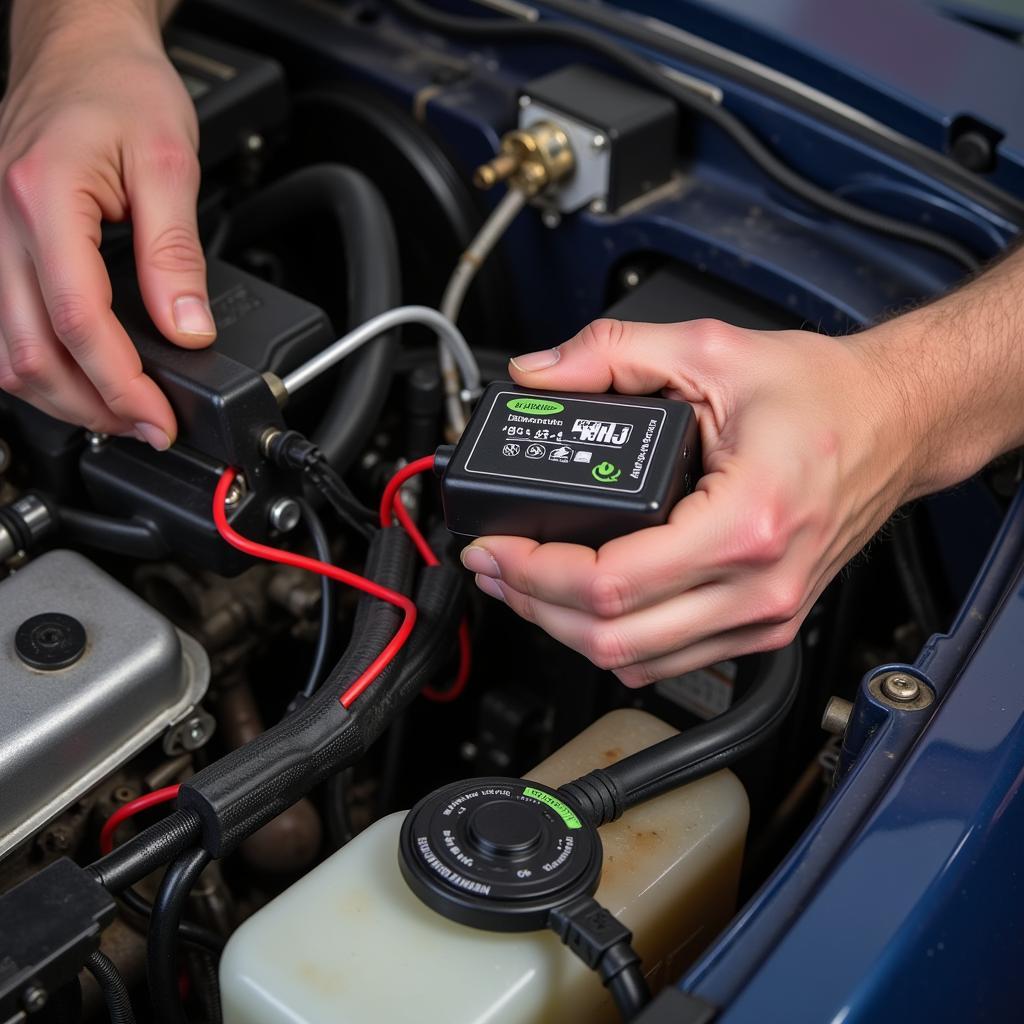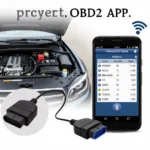The transition from OBD0 (On-Board Diagnostics 0) to OBD2 (On-Board Diagnostics 2) marked a significant advancement in automotive diagnostics. While OBD2 has become the standard for vehicles manufactured since the mid-1990s, many car enthusiasts and mechanics often find themselves navigating the complexities of OBD0 to OBD2 ECU (Engine Control Unit) conversions, especially when working on older vehicles. This article delves into the intricacies of OBD0 to OBD2 ECU conversions, shedding light on the process, benefits, and challenges involved.
Why Convert from OBD0 to OBD2?
OBD0 systems, prevalent in vehicles manufactured before 1996, often lacked standardized diagnostic capabilities. These systems typically relied on rudimentary diagnostic trouble codes (DTCs) and often required specialized equipment for interpretation. The introduction of OBD2 in 1996 revolutionized automotive diagnostics by establishing a universal standard for emission-related components and diagnostic procedures.
Converting from OBD0 to OBD2 offers several advantages, including:
- Enhanced Diagnostics: OBD2 systems provide more comprehensive and standardized diagnostic capabilities, making it easier to identify and troubleshoot engine-related issues.
- Improved Emission Control: OBD2 regulations mandate stricter emission standards, leading to improved fuel efficiency and reduced environmental impact.
- Wider Availability of Diagnostic Tools: OBD2 scanners are readily available and compatible with a wide range of vehicles, making it easier for car owners and mechanics to access diagnostic information.
- Increased Resale Value: Vehicles equipped with OBD2 systems are often perceived as more reliable and easier to maintain, potentially increasing their resale value.
Challenges in OBD0 to OBD2 ECU Conversions
While converting from OBD0 to OBD2 offers numerous benefits, it’s essential to acknowledge the complexities involved. Some common challenges include:
- Wiring Harness Compatibility: OBD0 and OBD2 systems utilize different wiring harnesses. Ensuring compatibility between the existing wiring harness and the new OBD2 ECU is crucial.
- Sensor Compatibility: OBD2 systems often require additional sensors or modifications to existing sensors to function correctly.
- Programming and Calibration: OBD2 ECUs require programming and calibration specific to the vehicle’s make, model, and engine.
- Technical Expertise: OBD0 to OBD2 ECU conversions demand a solid understanding of automotive electronics, wiring diagrams, and diagnostic procedures.
“Converting from OBD0 to OBD2 is not a simple plug-and-play operation,” explains John Smith, a certified automotive technician with over 20 years of experience. “It requires careful planning, a thorough understanding of the vehicle’s electrical system, and the right tools and expertise to ensure a successful conversion.”
Key Considerations for OBD0 to OBD2 ECU Conversions
Before embarking on an OBD0 to OBD2 ECU conversion, consider the following factors:
- Vehicle Compatibility: Not all vehicles are suitable candidates for OBD0 to OBD2 conversions. Research the specific make, model, and engine of your vehicle to determine compatibility and feasibility.
- Conversion Kits: Specialized conversion kits are available for certain vehicle models, simplifying the process by providing compatible components and detailed instructions.
- Professional Assistance: Consulting with a qualified automotive electrician or mechanic specializing in ECU conversions is highly recommended, especially for complex conversions or those requiring extensive modifications.
- Legal Requirements: In some regions, OBD0 to OBD2 conversions may be subject to specific legal requirements or emission testing regulations.
Conclusion
Converting from OBD0 to OBD2 can significantly enhance your vehicle’s diagnostic capabilities, improve emission control, and potentially increase its value. However, it’s crucial to approach this conversion with careful planning, a thorough understanding of the challenges involved, and a willingness to seek professional assistance when needed. By carefully considering these factors, you can make an informed decision about whether an OBD0 to OBD2 ECU conversion is the right choice for your vehicle.
If you’re considering an OBD0 to OBD2 ECU conversion or need assistance with OBD2 diagnostic tools, our team of experts at OBDFree is here to help. Contact us today to learn more about our products and services.
Do you have questions about OBD0 to OBD2 conversions? Check out our FAQs below:
FAQs
Q: Can I convert any OBD0 vehicle to OBD2?
A: No, not all OBD0 vehicles are suitable for conversion. Compatibility depends on factors like the vehicle’s make, model, engine, and the availability of compatible components.
Q: How much does an OBD0 to OBD2 conversion cost?
A: Conversion costs vary depending on factors such as vehicle complexity, parts required, labor costs, and whether you choose a DIY approach or seek professional assistance.
Q: Will an OBD0 to OBD2 conversion void my vehicle’s warranty?
A: It’s essential to check with your vehicle manufacturer or dealer, as modifications like ECU conversions can potentially void existing warranties.
Q: What are the common problems encountered during OBD0 to OBD2 conversions?
A: Common challenges include wiring harness compatibility issues, sensor compatibility problems, ECU programming and calibration difficulties, and the need for specialized tools and expertise.
Q: Where can I find reliable information and resources for OBD0 to OBD2 conversions?
A: Reputable automotive forums, online communities, and websites dedicated to ECU conversions can provide valuable insights, guides, and support.
For more information on OBD0 to OBD2 conversions, check out our other helpful resources:
- Rywire OBD0 to OBD2
- OBD0 to OBD2 Distributor Jumper Harness
- Testing MAP Sensor with OBD2 Scanner
- OBD2 ECU Tuning Tool
- OBD0 EF Dash Harness Convert to OBD2
Need further assistance? Don’t hesitate to reach out to our dedicated support team via WhatsApp at +1(641)206-8880 or email us at [email protected]. We’re available 24/7 to address your queries and provide expert guidance.


